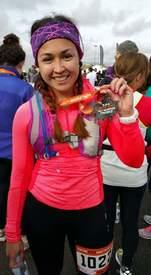Matt Fitzgerald - Ideal race weight

FitFitzy331
Posts: 308 Member
I was just wondering how much stock to put into the Matt Fitzgerald Ideal Race Weight calculator. I checked it out and it's saying that my ideal race weight is 123lbs and 13.6% BF. Right now I'm maintaining around 133lbs (5'4") and I can't really imagine myself 10lbs lighter. The last time I was 123lbs, I was a sophomore in high school and at the time I felt fine but looking back at pictures, I looked a bit gangly.
I would like my pace to be faster overall but I guess I'm wondering how much of a difference those 10lbs could make. I'm deciding between just continuing to maintain and train as planned or go back to aiming to lose weight for another 5lbs or so and see if that along with my continued training will help me get faster.
So does anyone aim for the "Ideal Race Weight," consider it a guideline within a range or is it just completely ignored and focused solely on training and nutrition?
I'm just looking for other opinions on this, I plan to think about it more before making any decisions on my personal goals.
I would like my pace to be faster overall but I guess I'm wondering how much of a difference those 10lbs could make. I'm deciding between just continuing to maintain and train as planned or go back to aiming to lose weight for another 5lbs or so and see if that along with my continued training will help me get faster.
So does anyone aim for the "Ideal Race Weight," consider it a guideline within a range or is it just completely ignored and focused solely on training and nutrition?
I'm just looking for other opinions on this, I plan to think about it more before making any decisions on my personal goals.
0
Replies
-
I think it definitely has merit.
I didn't start running until 2011 at 40 years old and 260 lbs. (5'6"). 2 years later I was at 166-170 lbs. and setting PRs at every distance, every time out culminating with my first marathon in 2013. After a short break I kept the weekly mileage up but got very lax on my eating.
Currently at 182 lbs., 19% body fat (fitbit scale) and haven't hit a PR at any distance since that marathon in 2013. It's a struggle to hit paces I was hitting consistently 2 years ago. I realize age has something to do with that but so do those 12-14 lbs.
The calculator estimates my Ideal Race Weight at 168 lbs & 13.4% body fat. Based on my experience, I was definitely running faster and easier at that suggested weight. It's been a struggle to get back there but I'll keep fighting.0 -
It tells me I should be 110lb and 13.2% bodyfat - I think the weight part is probably plausible (though I feel good at 114-117), but I think that low level of bodyfat sounds very implausible for me as a woman in her 30s, and I hate to think how I would look and feel at that level.0
-
I googled it, and this is way too much math for a humanities girl to handle. But I'm 135 now, and 5'3", so mine would probably be very similar to yours. I know I could race better 10 lbs lighter and with a lower BF% (especially around the middle... damn German ancestry!), but I'm looking more to be ~130 with a defined waist line
 The last time I was near 120 lbs was in high school, and I'm never going to have that metabolism again, so I think 130 would be far easier to maintain. 0
The last time I was near 120 lbs was in high school, and I'm never going to have that metabolism again, so I think 130 would be far easier to maintain. 0 -
mine says 207 lbs which i'm sure would be 'ideal for racing', but i would not want to be walking around that light.0
-
I need to check out the calculator. I run faster at 117 which I am now vs 123-125 which is what I was last year. I mean, I instantly got faster. I dropped 5lbs between when I got home from the Disney marathon is January and march and I finally broke 2 in the HM. Pretty sure it was the weight loss. I'm F 5'6".0
-
The BF% it gave me and other women who have posted is very low.
13-14%
That seems pretty unrealistic and difficult to maintain. That's essentially stage ready BF% for female fitness competitors...0 -
I've read his book that discusses it, and my memory is that it's more complicated and individualized, with a focus on your own performance too, but I can't go check now.
My sense is that yes, if running performance were the main thing you cared about, a body fat percentage of 17% or under for women (ideal is a range of 13-17% or some such? with lower generally being better?) would be expected--elite runners have quite low body fat and generally leanness (and even simply being lighter, for long distance running) makes you faster.
However, I don't think 17% or under is realistic for me, so I don't worry much about it.0 -
Thanks for your opinions everyone! I'm reading his 80/20 book now so after that I'll probably pick up Racing Weight and do a bit more research before making any sort of decision to lose more. I also thought 13% would be very difficult for me to maintain in the long term but maybe getting into the 120s wouldn't be a bad idea.
Thanks again!0 -
I'm actually also 5'4'' and weigh under 120 and I am nowhere near 13% bodyfat. Using the highly scientific 'looking in the mirror and estimating' technique, I'd put myself at about 18-20%. It's true that some of the other faster women runners at my club are skinnier than me, but I don't think they're as low as 13% either, and the handful really too-skinny looking local elites tend to perform better when fit but to be much more injury-prone in general.0
-
I have not heard about this before so I googled and calculated my numbers. Yikes. According to this I am way off. It says my BMI should be 16%. Yeah I am no where near that and don't know if I could ever reach that or maintain it. I am pretty happy with my current speed. I mean I am never going win a race and that's not really why I run anyway.
 It was interesting to see. 0
It was interesting to see. 0 -
sinister2014 wrote: »mine says 207 lbs which i'm sure would be 'ideal for racing', but i would not want to be walking around that light.
I ran the numbers on his site and it says I should weigh 203 lbs which is pretty much dead on with what I thought was a good weight. I have to say running was much easier at that weight (205ish) and I need to get back there. I was getting comments about being too skinny at that weight so I know what you mean. My mother was worried about me and my girlfriend kept asking me to gain weight. I appreciate all the concern but still, I was over 200 lbs.
I'm in the processor of dropping slowly this entire summer since I have nothing scheduled. We'll see in the fall how this works.
%raceweight
0 -
It seems the online calculator tool is pretty crude and is just designed to tell you that if you can lose weight you should (probably down to a certain point). Perhaps the book is more nuanced? I'd hope so!0
-
I checked mine online and it says I need to weigh about 163. That was withing 2 pounds of my goal weight anyway so 15 pounds to go. I haven't weighed that much since high school so it will be a new running experience.0
-
-
Is that an ideal weight for racing? Probably pretty close, although the body fat goal for women sounds low.
But is that the ideal weight for YOUR goals? Aesthetics, ability to adhere, general happiness, strength goals? You have to balance those against your desire to be a faster runner. Adding miles and losing weight made me a better runner, but my strength took a hit. I enjoy running more and progress there comes more easily to me, so that was a trade off I was willing to make.
FWIW, I am pretty much at my racing weight at 5'10.5", 155, and 10% BF. I followed IIFYM and not his DQS method though.0 -
What are you using to calculate your "ideal" racing weight? As I recall you are supposed to locate your current body fat% then move up 2 spots, unless you are in the top area when you only move up one. Are you trying to jump straight to the top section?
Another thing to keep in mind is that the goal of Racing Weight is to get ready for A race or A season; it is not meant to be the weight you maintain day-to-day for the rest of your life.0 -
David - it's just an online calculator where you put in your current details and it tells you what your 'ideal' weight would be - so it was ludicrously telling me to go from 18 to 13... which I'm pretty sure (as you say) is not really how it's meant to work.0
-
Roxiegirl2008 wrote: »I have not heard about this before so I googled and calculated my numbers. Yikes. According to this I am way off. It says my BMI should be 16%. Yeah I am no where near that and don't know if I could ever reach that or maintain it. I am pretty happy with my current speed. I mean I am never going win a race and that's not really why I run anyway.
 It was interesting to see.
It was interesting to see.
BMI and body fat are two completely different things.
The calculator from Matt uses body fat.0 -
Litsy that sounds like something that was generated using his formulas without any of the background considerations. I suggest you read the book, I found it much more useful than 80/20.0
-
I think it has merit too. I'm 5'10 and about 142 right now. It says my ideal racing weight is 138 and I know I was much faster at about 135... Even five pounds makes a difference in my ability to hold quick paced for longer distances0
-
I am 5'7" and weigh 148 currently. The calculator gives me answers ranging from 143-146 depending on how I tweak the inputs. I think that is probably a fair estimation of my ideal race weight as I found in the past that I was fastest when I was between 143 and 145. I try to get down to 142 a few weeks ahead of an A-race and then allow a little bit of a "bump" back up over the taper period.0
-
I am 5'0 and currently right around 102 lbs. The calculator gives me an ideal racing weight of 94 lbs.(although I have no clue what my current body fat% is, so I guessed). I have been down to that weight in the past year (due to illness, not choice) and I was not at all comfortable there. Yes, maybe it was good for my performance, but it wasn't really good for everything else in my life. I guess it depends on where your performance falls in terms of priorities. I feel like it is a pretty high priority in terms of how I spend my free time, but my over all health is a much higher priority and I do not feel at all like I could be in great health and be at that weight.0
-
It says that I should be around 162 as my ideal weight (currently 170). I've read both his Racing Weight and his 80/20 books. His point is that if you have haul something around, it should be muscle and skeletal tissue that will help get you from point A to point B the fastest. The trick is to lose fat and not muscle mass.
When I was last down at 162 (a little over a two years ago), I can't say that it necessary looked "good." But then again, I was only walking and hiking, not running. The combination of running and other cross training has changed (and continues to change) my body configuration. When I started speed work last summer, my weight jumped up from the increased activity before gradually dropping back down.
I have set 165 as the next weight goal for my next goal race.
One other thing. I have attempted, with some success, Fitzgerald's fueling plan (10-14 day caffeine cutoff, three day carb load, and in-race fueling). It won't make up for or completely offset poor race execution (e.g., going out too fast for conditions), but it can help. I have been amazed at just how good I've felt at the end of most recent marathon races compared to my earlier experiences.0 -
Ideal race weight is 174...which is the upper limit BMI for me. My body was just not built to be a runner. #foreverFatty
 0
0 -
I was surprised at mine - 221 pounds. Supposedly my ideal BMI is 180. I'm currently 235, so I'm happily surprised to be that close to a good running weight!
 0
0 -
His online calculator is close for me. It says 150-153lbs, and my goal weight is 155. I'm 44 yr old 5'8" female. Seeing as that's 17-19% BF, though, might be why I'm having a hard time losing these last few pounds.0
-
Does anyone want to link the online calculator?0
-
-
I am not entirely convinced the calculator really tells you anything. It seems to give me what I think is my ideal race weight, but I am *really* lean already.
I'll paraphrase the slowtwitch.com "mantra" on race weight: The idea is to keep losing weight until you start hearing your coworkers whispering about your weight. Then you know you are within 10lbs. Once your family starts asking if you have a cancer-like disease you are within 5lbs. And when they finally stage an intervention, you are there.
That is a bit tongue-in-cheek but really you find your race weight by continuing to lose weight until you start getting sick too often, and you actually notice your run times are getting worse, then gain a bit, and that is your ideal race weight. For most, that is going to be downright gaunt.0 -
I am not entirely convinced the calculator really tells you anything. It seems to give me what I think is my ideal race weight, but I am *really* lean already.
I'll paraphrase the slowtwitch.com "mantra" on race weight: The idea is to keep losing weight until you start hearing your coworkers whispering about your weight. Then you know you are within 10lbs. Once your family starts asking if you have a cancer-like disease you are within 5lbs. And when they finally stage an intervention, you are there.
That is a bit tongue-in-cheek but really you find your race weight by continuing to lose weight until you start getting sick too often, and you actually notice your run times are getting worse, then gain a bit, and that is your ideal race weight. For most, that is going to be downright gaunt.
At 191 I am almost there, coworkers saying I've lost too much, RW is suggested at another 15lbs down, I would be downright gaunt. My wife already complains that I am just skin and bone and that my calves are as big as my thighs. She exaggerates a little, but they are big. My guess is that I could lose half that, but I love food more than I love fast times!!
0
This discussion has been closed.



















